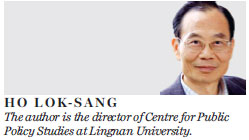Adversarial democracy is no panacea for HK
Updated: 2015-03-10 07:48
By Ho Lok-Sang(HK Edition)
|
|||||||
For as long as we have had official data on economic growth, until 2010 Hong Kong had never experienced more than two years when economic growth fell below 3 percent. This period covers almost half a century since 1962. It included such tumultuous events as the "cultural revolution" (1966-76), the first global oil crisis following the OPEC embargo (1974-75), the great recession following the Asian financial crisis (1998-99), the bursting of the dotcom bubble (2001-02), and the global financial crisis (GFC) of 2007-08. The GFC was regarded by some as a major catastrophe which might occur only "once in a century". Each time, Hong Kong registered no more than two consecutive years of low economic growth. This time, however, with no major crisis, the SAR has already had three years of low growth and 2015 is expected to be another sluggish year economically. This unprecedented poor economic performance demands an explanation. What is wrong?
Our neighbor Singapore today has a population of less than 5.5 million and yet boasts a range of GDP figures higher than ours. Its economic growth rates over the last four years were 6.2, 3.3, 4.4, and 2.9 percent, respectively. These compare favorably with Hong Kong's figures for the same period of 4.8, 1.7, 2.9, and 2.3 percent. Hong Kong's economic growth has lagged behind Singapore's for six consecutive years. While economic growth is not everything, the SAR needs to accept that it faces some major economic challenges. There can be no room for complacency. In a highly competitive world, it is possible that Hong Kong may lose ground to its competitors. Future living standards may fall.
Many commentators have already addressed how internal disputes have slowed the development of Hong Kong's economy and improvements in livelihoods. Behind these divisions, however, there is actually a more worrying trend: the gradual transformation of our "can do" culture and an erosion of Hong Kong's social capital.
I have defined social capital as the ability of a society to work together to solve problems and work for a common goal. Generally speaking, the source of social capital lies in shared values and an ability to see the big picture. Strong societies consist of individuals who can look beyond their personal gains and the immediate future. They have leaders who can inspire trust and solidarity, and who can encourage their citizens to work for the common good. Their eyes are never on short-term gains but are focused on long-term benefits for everyone. They can inspire because they are not intimidated by tough challenges. They can focus on the things which matter most. When they see problems, they don't come up with knee-jerk reactions. They can develop bold policy initiatives that really work. They can cooperate with others to get things done, rather than looking for political gain at every opportunity.

Unfortunately, some forms of democracy are based on an adversarial culture. This is not conducive to solving problems. Sadly, even ordinary people's attitudes have changed. In saying this, I am not trying to blame any particular person or party. Such attitudes are really the result of an adversarial system of democracy. My concerns are that as adversarial democracy becomes the standard of democracy, our government will become dysfunctional. Politicians and officials will focus on defending their positions rather than the greater public good. Under an adversarial system of democracy, politicians do not necessarily work to educate the public. No one really bothers to explain the problems with erroneous policies.
As a policy analyst I am fortunate in being able to stay aloof. I have criticized the Special Stamp Duty as unenlightened. It has contributed to a sharp reduction in the supply of starter homes on the secondary housing market. These could have been made available to other families in the position to sell their existing homes for better ones. My own analysis demonstrated that this also resulted in a sharp reduction in many related activities, including brokerage, banking, decorating and renovation, moving and transportation, conveyancing, accountancy services, and even retailing.
Years ago, a legislator privately told me that he agreed with my suggestion for raising medical fees and charges while capping annual medical expenses. But he was unwilling to state this publicly. No legislator would dare say anything like this - even though many patients may prefer to pay a little more for better services and shorter waiting times.
As Hong Kong moves toward greater electoral democracy, the SAR should remember that adversarial democracy is anything but a panacea for our problems.
(HK Edition 03/10/2015 page11)